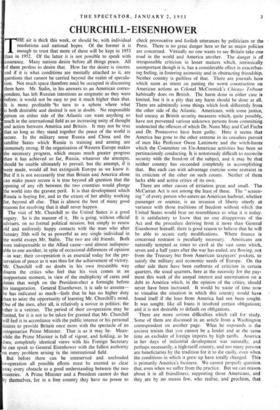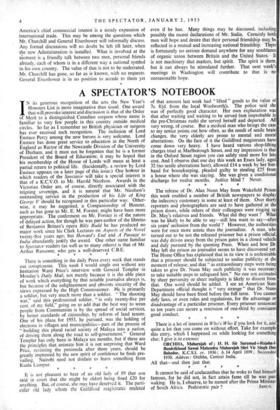CHURCHILL EISENHOWER
THE air is thick this week, or should be, with individual resolutions and national hopes. Of the former it is enough to trust that moreof them will be kept in 1953 than in 1952. Of the latter it is not possible to speak with assurance. Many nations desire before all things peace. All of them profess to desire that. How far the desire is sincere, and if it is what conditions are mentally attached to it, are questions that cannot be carried beyond the realm of specula- tion. Not much space therefore need be occupied in discussing them here. Mr. Stalin, in his answers to an American corres- pondent, has left Russian intentions as enigmatic as they were before; it would not be easy to put it much higher than that.
It is more profitable 4to turn to a sphere where what is both desirable and desired is not in doubt. No responsible person on either side of the Atlantic can want anything so much in the international field as an increasing unity of thought and action between America and Britain. It may not be true that so long as they stand together the peace of the world is secure. In the military sense Russia and China and the satellite States which Russia is training and arming are ensely strong. If the organisation of Western Europe makes the necessary progress, which means much greater progress han it has achieved so far, Russia, whatever she attempts, should be unable ultimately to prevail: but the attempt, if it were made, would all but extinguish Europe as we know it.
But if it is not necessarily true that Britain and America alone can make peace secure it is true beyond all question that the opening of any rift between the two countries would plunge the world into the gravest peril. It is that development which Russia is hoping for, and to the extent of her ability working for, beyond all else. That is almost the best of many good easons for resolving that it shall never happen.
The visit of Mr. Churchill to the United States is a good augury. So is the manner of it. He is going, without official advisers, on no formal political mission, but simply to renew old and uniformly happy contacts with the man who after January 20th will be as powerful as any single individual in the world except Mr. Stalin. The two are old friends. Both were indispensable to the Allied cause—and almost indispens- able to one another, in spite of occasional differences of opinion —in war; their co-operation is as essential today for the pre- servation of peace as it was then for the achievement of victory. Mr. Churchill will no doubt in his own irresistible way disarm the critics who feel that his visit comes at an inopportune moment, in view of the multiplicity of cares and duties that weigh on the President-elect a fortnight before his inauguration. General Eisenhower, it is safe to assume— he has indicated as much—feels that he has no higher duty than to seize the opportunity of learning Mr. Churchill's mind.
ne of the men, after all, is relatively a novice in politics; the ther is a veteran. The period of their co-operation may be mited, for it is not to be taken for granted that Mr. Churchill will feel it in accordance with the public interest or his personal desires, to provide Britain once more with the spectacle of an octogenarian Prime Minister. That is as it may be. Mean- while the Prime Minister is full of vigour, and holding, as he does, completely identical views with his Foreign Secretary he can speak to General Eisenhower with the fullest authority on every problem arising in the international field.
But before there can be unreserved and unclouded co-operation all possible efforts must be exerted to clear away every obstacle to a good understanding between the two countries. A Prime Minister and a President cannot do that y themselves, for in a free country they have no power to check provocative and foolish utterances by politicians or the Press. There is no great danger here so far as major policies are concerned. Virtually no one wants to see Britain take one road in the world and America another. The danger is of irresponsible criticism in lesser matters which, intrinsically unimportant though it is, has a considerable effect in exacerbat- ing feeling, in fostering animosity and in obstructing friendship. Neither country is guiltless of that. There are journals here which seem as intent on putting the worst construction on American actions as Colonel McCormick's Chicago Tribune habitually does on British. The harm done in either case is limited, but it is .a pity that any harm should be done at all.
There are admittedly some things which look differently from the other side of the Atlantic. Americans, with some justice. feel uneasy at British security measures which, quite possibly.
have not prevented various unknown persons from committing undetected the offences of which Dr. Nunn May and Carl Fuchs and Dr. Pontecorvo have been guilty. Here it seems that America has gone to the other extreme in its ceaseless pursuit of men like Professor Owen Lattimore and the witch-hunts which the Committee on Un-American activities has been so pertinaciously conducting. It is notoriously difficult to reconcile security with the freedom of the subject, and it may be that neither country has succeeded completely in accomplishing that. But each can with advantage exercise some restraint in its criticism of the other on such counts. Neither of them lacks able and active critics of its own.
There are other causes of irritation great and small. The McCarran Act is not among the least of these. The "screen- ing " of every person who enters an American harbour, whether passenger or seaman, is an invasion of liberty utterly at variance with those traditions of freedom without which the United States would bear no resemblance to what it is today.
It is satisfactory to know that no one disapproves of the Act and the procedure deriving from it more than General Eisenhower himself; there is good reason to believe that he will be able to secure early modifications. Where finance is concerned restraint is peculiarly necessary. Americans are naturally tempted at times to cavil at the vast sums which, seven and a half years after the war has ended, are flowing, not from the Treasury but from American taxpayers' pockets, to satisfy the military and economic needs of Europe. On the other side there have been outbursts of criticism in certain quarters, the usual quarters, here at the necessity for the pay- ment this week of the annual interest and amortisation on a debt to America which, in the opinion of the critics, should never have been increased. It would be waste of time now to visualise the situation in which this country would have found itself if the loan from America had not been sought. It was sought; like all loans it involved certain obligations; and it is not desirable to default on obligations.
There are more serious difficulties which call for study. Some of them are discussed in an article from a Washington correspondent on another page. What he expounds is the ancient truism that you cannot be a lender and at the same time an excluder of foreign imports by high tariffs. America in her days of industrial development was naturally, and perhaps necessarily, a high-tariff country, and too many persons are beneficiaries by the tradition font to die easily, even when the conditions in which it grew up have totally changed. This is primarily America's business. We cannot properly question that, even when we suffer from the practice. But we can reason about it in all friendliness, supporting those Americans, and they are by no means few, who realise, and proclaim, that America's chief commercial interest is a steady expansion of international trade. This may be among the questions which Mr. Churchill and General Eisenhower will informally discuss. Any formal discussions will no doubt be left till later, when the new Administration is installed. What is involved at the moment is a friendly talk between two men, personal friends already, each of whom is in a different way a national symbol in his own country. The value of that is not to be underrated. Mr. Churchill has gone, so far as is known, with no requests. General Eisenhower is in no position to accede to them yet even if he has. Many things may be discussed, including possibly the recent declarations of Mr. Stalin. Certainly both men will hope and desire that their personal friendship may be reflected in a mutual and increasing national friendship. There is fortunately no serious demand anywhere for any semblance of organic union between Britain and the United States. It is not machinery that matters, but spirit. The spirit is there, but it can always be stimulated further. That next week's meetings in Washington will contribute to that is no unreasonable hope.































 Previous page
Previous page